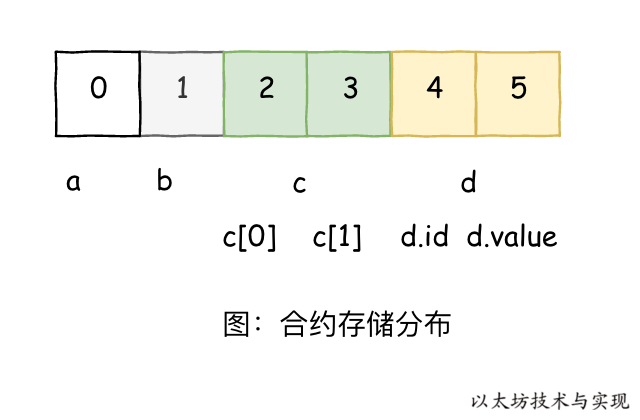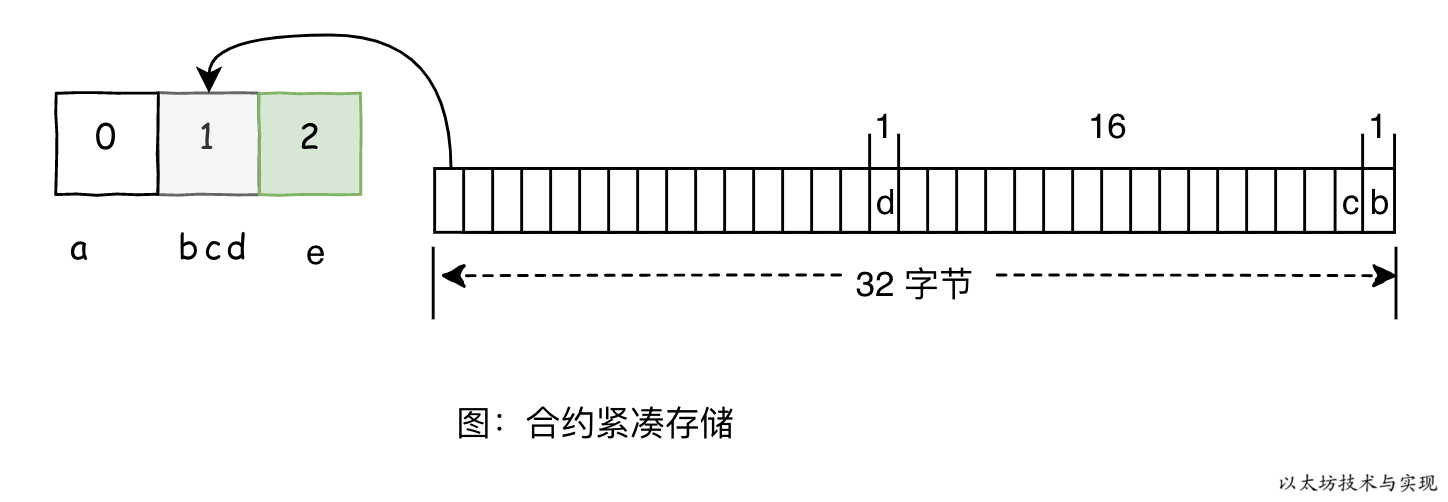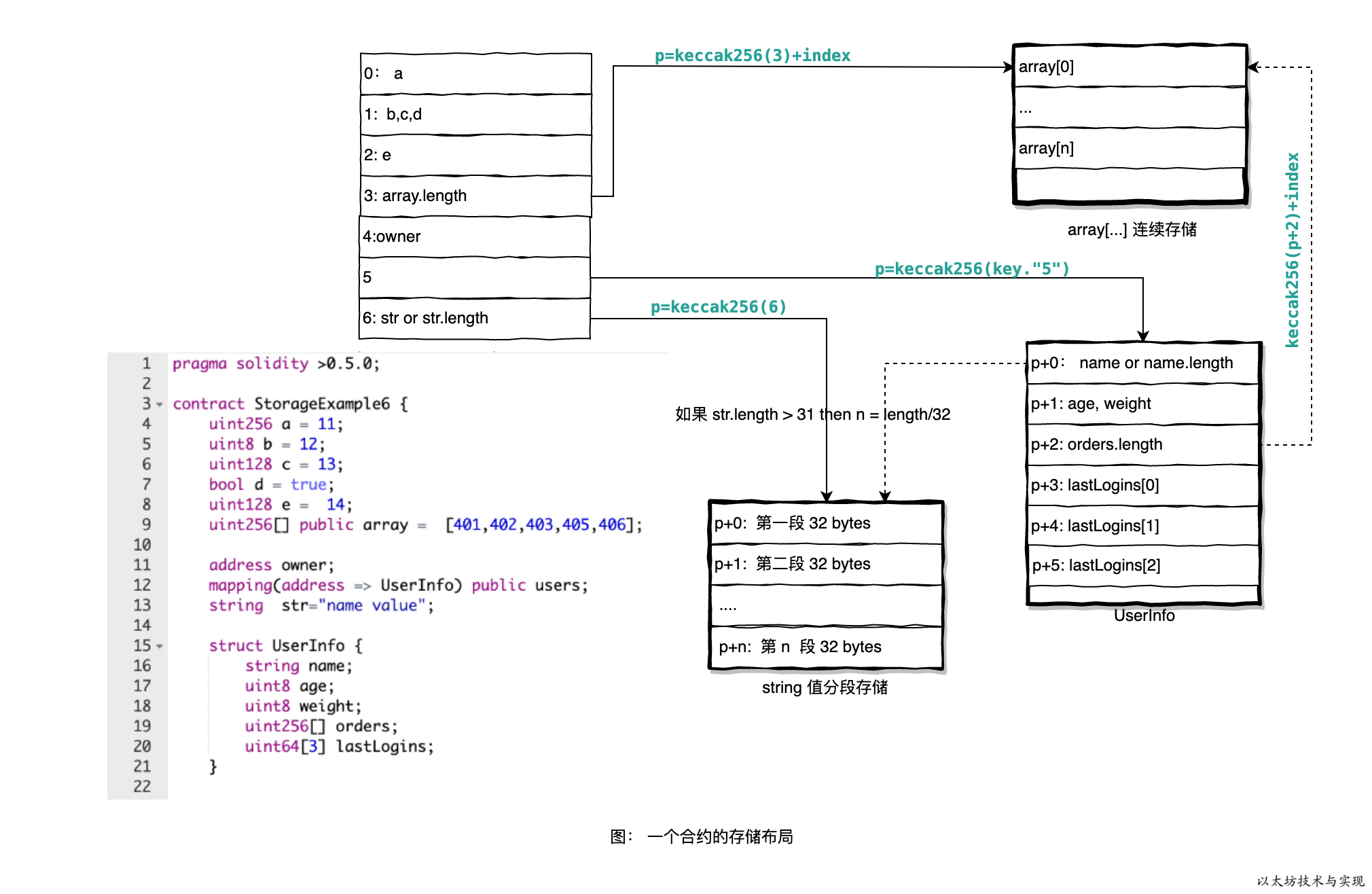- Write or read status data cost gas! GAS Token
SloadGas = 50
SstoreSetGas = 20000 // Once per SSTORE operation.
SstoreResetGas = 5000 // Once per SSTORE operation if the zeroness changes from zero.
SstoreClearGas = 5000 // Once per SSTORE operation if the zeroness doesn't change.
SstoreRefundGas = 15000 // Once per SSTORE operation if the zeroness changes to zero.
-
Reset data usage slots
struct OwnableStorage { address _owner; } bytes32 private constant OwnableStorageLocation = 0x9016d09d72d40fdae2fd8ceac6b6234c7706214fd39c1cd1e609a0528c199300; function _getOwnableStorage() private pure returns (OwnableStorage storage $) { assembly { $.slot := OwnableStorageLocation } }
Read value from key-value database!
value = db.get(key) / // value is 32 bytes = uint256
Have
total slots = 5 * sands on the earth !
call solc --storage-layout src/Bank.sol
{
"astId": 40,
"contract": "src/Bank.sol:Bank",
"label": "owner",
"offset": 0,
"slot": "0",
"type": "t_address"
}astIdis the id of the AST node of the state variable’s declarationcontractis the name of the contract including its path as prefixlabelis the name of the state variableoffsetis the offset in bytes within the storage slot according to the encodingslotis the storage slot where the state variable resides or starts. This number may be very large and therefore its JSON value is represented as a string.typeis an identifier used as key to the variable’s type information (described in the following)
- Store the variables in the order in which they are defined.
- Compact Storage: Less than 32 bytes, stored in a Slot.
value types: Booleans、number、address...
contract StorageExample {
uint8 public a = 11; // 0
uint256 b=12; // 1
uint256[2] c= [13,14]; // [2]=13,[3]=14 //. c[0]=13*2 // set store(2,26)
Entry d; // [1]=[age], [2]=ethBalance
struct Entry {
uint8 age; // max= 256
uint256 ethBalance; // eth
}
}contract StorageExample2 {
uint256 a = 11;
uint8 b = 12;
uint128 c = 13;
bool d = true;
uint128 e = 14;
}
string = bytes = []bytes32 = []number
if content size < 32 : 32bytes= [ content,.... ,size*2]
else 32bytes= [...... ,size*2+1]
contract Example{
string a = "我比较短"; //0
// [1]=value= length * 2 +1
// start = hash(slot=1)= uint256
// slots[start+0],slots[start+1],....slots[start+3]
string b = "我特别特别长,已经超过了一个插槽存储量";
uint16[] public x = [401,402,403,405,406];
uint256[] public y = [401,402,403,405,406];
}
Value start slot = hash(abi.encode(key,mapSlot=0))
contract StorageExample5 {
mappping(string => uint256) a;// 0
mappping(string => uint256) b;// 1
constructor()public {
a["u1"]=18; // u1 value slot = hash("u1",0)
a["u2"]=19; // u2 value slot = hash("u2",0)
}
}
function read(bytes32 slot) external view returns(bytes32 data){
assembly {
data := sload(slot) // load from store
}
}
function write(bytes32 slot,uint256 value) external {
assembly{
sstore(slot,value)
}
}or call etc_storageAt() RPC API
在NFT Market合约中使用Slot模式读取和修改Owner地址







